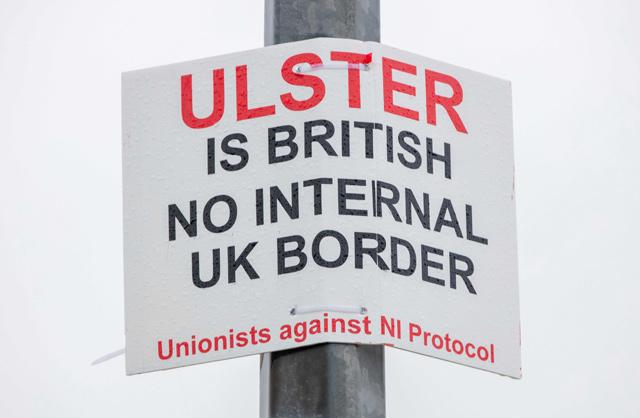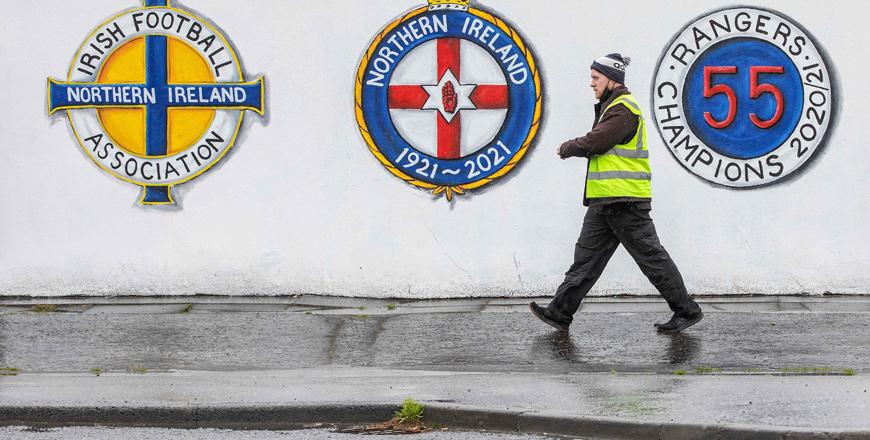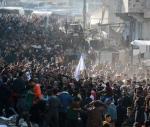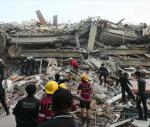You are here
N.Ireland halts post-Brexit checks over staff safety fears
By AFP - Feb 02,2021 - Last updated at Feb 02,2021

A unionist poster against a possible UK internal border is attached to a post at the Port of Larne in County Antrim, Northern Ireland, on Tuesday after threats were made to port workers implementing post-Brexit trade checks in Northern Ireland (AFP photo)
LARNE, United Kingdom — The British government on Tuesday condemned threats to port workers implementing controversial post-Brexit trade checks in Northern Ireland, calling for clear heads to ease fears of an upsurge in sectarian tensions.
Checks were suspended at Belfast and Larne ports late Monday, and the European Commission said it told its staff working at two border posts in the British province to stay away.
The development comes just over a month into new trading arrangements after Brexit took full effect, and warnings it could stoke lingering community tensions in Northern Ireland.
Senior UK minister Michael Gove called the situation “completely unacceptable”, echoing condemnation from the power-sharing Northern Ireland executive and the European Commission.
“It’s vital that everyone in Northern Ireland, and indeed the UK, exercises calmness and moderation as well as resolution to resolve the problems,” he told parliament.
The suspension to regulatory animal-based food checks were dropped on the orders of Northern Ireland’s Department of Agriculture, Environment and Rural Affairs.
At Larne Port, 12 staff was pulled from duties after “an upsurge in sinister and menacing behaviour in recent weeks”, the Mid and East Antrim Borough Council said.
Hardcore unionists have been blamed for graffiti criticising the Northern Ireland Protocol and describing port staff as “targets”, it added.
Attempts also seemed to have been made to collect information on employees, including vehicle registration plates, in acts of intimidation recalling the darkest days of “The Troubles” in Northern Ireland, media reported.
But officers are said to have no evidence that intimidation efforts are being organised by the main loyalist paramilitaries active in the province.
Police Service of Northern Ireland (PSNI) Assistant Chief Constable Mark McEwan told the BBC it was “individuals or small groups of people” responsible.
Lorries were still passing through the port at Larne, but police patrols have nevertheless been stepped up, while Northern Ireland’s leaders are due to talk to UK and EU ministers on Wednesday.
The protocol
The Northern Ireland Protocol came into effect on January 1, when the Brexit transition period ended and the full effects of the UK’s 2016 decision to split from the EU were finally felt.
The protocol is designed to prevent a hard border emerging between the north and EU member the Republic of Ireland — a frequent flashpoint in three decades of violence over British rule.
Up to 1998, some 3,500 people were killed as unionists who back ties to Britain engaged in a deadly tug-of-war with republicans seeking to merge the province with Ireland.
Security checkpoints and patrols along the 500 kilometre border were targeted by republican paramilitaries in some of the bloodiest chapters of the sectarian violence.
Post-Brexit, London and Brussels feared splinter republican groups still active after the 1998 Good Friday Agreement peace deal could target checks and use them as a recruiting tool to grow their base.
‘Sea border’
The protocol avoids the need for a hard border by transplanting EU single market and customs union checks to Northern Irish ports and airports.
However, some unionists believe they create a de facto “sea border” between Northern Ireland and mainland Britain — England, Scotland and Wales.
They feel the border disrupts the key principle of free movement between the united territories and binds the province in an economic union with Ireland.
Unionists — and more hardcore loyalists sometimes linked to paramilitaries — branded 2019 legislation to enact the Northern Ireland protocol “The Betrayal Act”.
Last week, the PSNI’s McEwan said officers were noticing “growing discontent” among the unionist community — chiefly graffiti and on social media.
The protocol became the renewed focus of unionist ire last weekend after a coronavirus vaccine row pushed the European Commission to warn it would invoke “Article 16” of the treaty to restrict jab exports to the province.
The fallback provision allows London or Brussels to unilaterally suspend aspects of the deal in special circumstances.
Brussels quickly backtracked on the threat — now widely considered a diplomatic bungle — after criticism from the UK, Ireland and all of Northern Ireland’s mainstream political parties.
Gove said the EU decision on Friday was a “serious mistake” and that “trust has been eroded” between London and Brussels.
“The EU needs to work with us at speed and with determination to resolve the serious outstanding issues with the protocol,” he told lawmakers.
Related Articles
BELFAST — Northern Ireland marked its centenary on Monday under coronavirus restrictions, simmering post-Brexit unrest and a leadership cris
DUBLIN — A week of rioting in Northern Ireland is the first evidence Brexit turbulence may be boiling into unrest in the British province, where post-EU rules are stoking fury among pro-UK sections.
BRUSSELS — The European Union said on Saturday it was weighing its "next steps" after Britain formally responded to Brussels over the launch


















